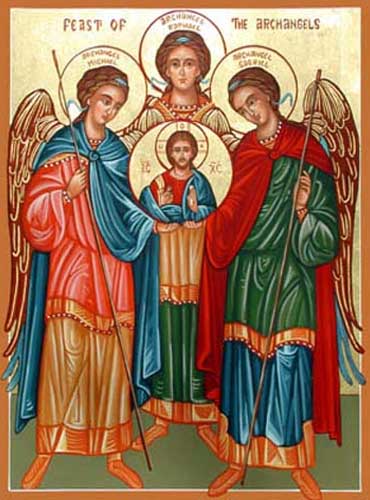Feast of Saints Michael, Gabriel, and Raphael, Archangels
Today’s feast of the Archangels is very important, especially for the world we live in. On one hand, we have people who want nothing to do with the saints, with Mary, with the Church, or with anything other than Jesus; they think that any other devotion somehow diminishes Christ. On the other hand, in the New Age, for instance, there is an obsession with angels to the point of forgetting Christ.
Yet, the Church’s teaching avoids both these extremes. As Pope Saint John Paul the Second remarked, “the Church . . . renders a great service when she proposes . . . the truth about God the Creator and also about the angels. Man nurtures the conviction that it is he (and not the angels) who is at the center of the divine revelation in Christ, man and God.”[1] In other words, in venerating the angels, we come to reflect on our relationship with God. We can see how this is so in meditating on two points: first, when we examine the nature of angels, and secondly, when we consider their office.
First, as Pope Benedict XVI tells us, “the Angel is a creature who stands before God, oriented to God with his whole being. All three names of the Archangels end with the word ‘El,’ which means ‘God.’ God is inscribed in their names, in their nature. Their true nature is existing in his sight and for him.” By their spiritual nature, angels remind us that we too have a spiritual soul; we, like them, have an eternal destiny. “The angels speak to man of what constitutes his true being,” continues Benedict, “of what in his life is so often concealed and buried”: that is, his eternal, immortal soul.[2] Likewise, just as the angels who refused to follow God suffer eternally, and those who chose Him enjoy seeing “the face of the Father who is in heaven” (cf. Mt 18:10), we must also choose our allegiance. Here we can see that a true devotion to and veneration of the angels necessarily means considering them as secondary to God.
This leads to our second point: by their office, angels are agents of Divine Providence in our lives, providing real assistance to us. In the letter to the Hebrews, we read the question: “Are not all [angels] ministering spirits sent to serve, for the sake of those who are to inherit salvation?” (1:14). “They bring God to men, they open heaven and thus open earth. Precisely because they are with God,” continues Benedict, “[the angels] can also be very close to man. They bring man back to himself, touching him on God’s behalf.” The archangels fight the devil, as Michael did, announce the good news of Salvation like Gabriel, or bring healing and assurance, as was the task of Raphael. But why? Why do they do these things? It’s not their own initiative: as Raphael tells Tobit (12:18): “As for me, when I was with you, I was not acting out of any favor on my part, but by God’s will.” Venerating the angels leads us back to the One who loves us enough to send them, the King of Angels. Indeed, Raphael tells Tobit, and each one of us, how to respond to this gift of angels: “Bless God and give Him thanks before all the living for the good things He has done for you. . . . Proclaim before all with due honor the deeds of God, and do not be slack in thanking Him” (Tobit 12:6).
As we prepare to receive the Bread of Angels, let us ask for the grace to always think of our eternal destiny, and to choose to serve God, as Michael, Raphael, and Gabriel did; let us also thank the King of Angels for His providence in providing us with their help. We ask this through the intercession of Our Lady, Queen of Angels.
[1] General Audience of August 6th, 1986.
[2] Homily of September 27th, 2007.






